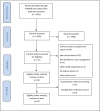Case management interventions in chronic disease reduce anxiety and depressive symptoms: A systematic review and meta-analysis
- PMID: 37058492
- PMCID: PMC10104285
- DOI: 10.1371/journal.pone.0282590
Case management interventions in chronic disease reduce anxiety and depressive symptoms: A systematic review and meta-analysis
Abstract
Background: There is no systematic insight into the effect of case management on common complications of chronic diseases, including depressive symptoms and symptoms of anxiety. This is a significant knowledge gap, given that people with a chronic disease such as Parkinson Disease or Alzheimer's Disease have identified care coordination as one of their highest priorities. Furthermore, it remains unclear whether the putative beneficial effects of case management would vary by crucial patient characteristics, such as their age, gender, or disease characteristics. Such insights would shift from "one size fits all" healthcare resource allocation to personalized medicine.
Objective: We systematically examined the effectiveness of case management interventions on two common complications associated PD and other chronic health conditions: Depressive symptoms and symptoms of anxiety.
Methods: We identified studies published until November 2022 from PubMed and Embase databases using predefined inclusion criteria. For each study, data were extracted independently by two researchers. First, descriptive and qualitative analyses of all included studies were performed, followed by random-effects meta-analyses to assess the impact of case management interventions on anxiety and depressive symptoms. Second, meta-regression was performed to analyze potential modifying effects of demographic characteristics, disease characteristics and case management components.
Results: 23 randomized controlled trials and four non-randomized studies reported data on the effect of case management on symptoms of anxiety (8 studies) or depressive symptoms (26 studies). Across meta-analyses, we observed a statistically significant effect of case management on reducing symptoms of anxiety (Standardized Mean Difference [SMD] = - 0.47; 95% confidence interval [CI]: -0.69, -0.32) and depressive symptoms (SMD = - 0.48; CI: -0.71, -0.25). We found large heterogeneity in effect estimates across studies, but this was not explained by patient population or intervention characteristics.
Conclusions: Among people with chronic health conditions, case management has beneficial effects on symptoms of depressive symptoms and symptoms of anxiety. Currently, research on case management interventions are rare. Future studies should assess the utility of case management for potentially preventative and common complications, focusing on the optimal content, frequency, and intensity of case management.
Copyright: © 2023 Geerlings et al. This is an open access article distributed under the terms of the Creative Commons Attribution License, which permits unrestricted use, distribution, and reproduction in any medium, provided the original author and source are credited.
Conflict of interest statement
The authors have declared that no competing interests exists.
Figures




Similar articles
-
Behavioural modification interventions for medically unexplained symptoms in primary care: systematic reviews and economic evaluation.Health Technol Assess. 2020 Sep;24(46):1-490. doi: 10.3310/hta24460. Health Technol Assess. 2020. PMID: 32975190 Free PMC article.
-
Telephone interventions for symptom management in adults with cancer.Cochrane Database Syst Rev. 2020 Jun 2;6(6):CD007568. doi: 10.1002/14651858.CD007568.pub2. Cochrane Database Syst Rev. 2020. PMID: 32483832 Free PMC article.
-
Psychological therapies for the treatment of depression in chronic obstructive pulmonary disease.Cochrane Database Syst Rev. 2019 Mar 6;3(3):CD012347. doi: 10.1002/14651858.CD012347.pub2. Cochrane Database Syst Rev. 2019. PMID: 30838649 Free PMC article.
-
Psychosocial interventions for preventing and treating depression in dialysis patients.Cochrane Database Syst Rev. 2019 Dec 2;12(12):CD004542. doi: 10.1002/14651858.CD004542.pub3. Cochrane Database Syst Rev. 2019. PMID: 31789430 Free PMC article.
-
The effects of self-management interventions on depressive symptoms in adults with chronic physical disease(s) experiencing depressive symptomatology: a systematic review and meta-analysis.BMC Psychiatry. 2021 Nov 20;21(1):584. doi: 10.1186/s12888-021-03504-8. BMC Psychiatry. 2021. PMID: 34800995 Free PMC article.
Cited by
-
A meta-analysis identifies factors predicting the future development of freezing of gait in Parkinson's disease.NPJ Parkinsons Dis. 2023 Dec 4;9(1):158. doi: 10.1038/s41531-023-00600-2. NPJ Parkinsons Dis. 2023. PMID: 38049430 Free PMC article. Review.
-
Development of a patient-centered transition program for stroke survivors and their informal caregivers, combining case-management and access to an online information platform: A user-centered design approach.Digit Health. 2024 Aug 6;10:20552076241272628. doi: 10.1177/20552076241272628. eCollection 2024 Jan-Dec. Digit Health. 2024. PMID: 39114116 Free PMC article.
References
Publication types
MeSH terms
LinkOut - more resources
Full Text Sources
Medical
Miscellaneous

